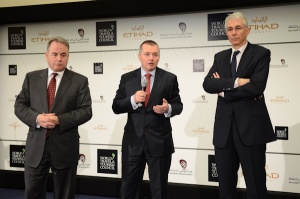WTTC 2013: Aviation takes centre stage at Global Summit
 James Hogan, chief executive of Etihad Airways, left, is joined by Willie Walsh, IAG, and Tony Tyler, secretary general, IATA
James Hogan, chief executive of Etihad Airways, left, is joined by Willie Walsh, IAG, and Tony Tyler, secretary general, IATA Government inaction and a lack of understanding of the positive long term economic impacts of international air traffic growth dominated discussion at the opening session of day two of the 13th annual World Travel & Tourism Council Global Summit.
A panel of airline industry leaders reiterated the call for increased government support – and the abolition of passenger duty taxes - to navigate a route towards sustainable sector development.
Moderated by Peter Greenberg, travel editor, CBS News, the discussion covered political and economic instability, capacity, runway access, government policies, taxes and environmental sustainability as part of a session entitled ‘Airlines: Turbulence or clear skies ahead?’.
“Aviation is a fast-moving, highly competitive environment; high cost, low margins. One of the biggest challenges we face is convincing governments that airlines should have greater and easier access,” remarked James Hogan, chief executive, Etihad Airways, in his presentation.
Also on the panel was Willie Walsh, chief executive, International Airlines Group, who agreed with the stance taken by Hogan.
“Not a single penny raised through passenger duty goes to the industry or environmental issues.
“As a vehicle to trigger economic growth, we need a fundamental change in attitude from governments in Europe.
“A recent PricewaterhouseCoopers shows that if you scrap the tax, you actually boost the economy and see a positive effect.”
The importance of partnerships to today’s airline business model was highlighted by Hogan who says that it is critical in terms of bilateral value, and essential to achieve a lower cost base and scale.
“How we partner is certainly changing and the ability to build a stronger proposition is fundamental.
“We are seeing the emergence of the battle of the hubs, and so that connectivity model is vital.
“Government policies make it difficult to move as fast as one would like, but we are seeing strong opportunities for growth,” he remarked.
With consolidation not an option in certain markets, partnership through alliances is the norm, but Walsh says they are a “poor substitute for proper consolidation.”
“We have to accept that if you didn’t have restrictions on ownership or control, you would be seeing more consolidation.
“But we are an industry that’s always changing; five years from now you will see a very different industry, and 20 years form now it will be unrecognisable,” he said.
Walsh cited the US as an example where consolidation is driving change for the better, with just five carriers currently controlling 84-85 per cent of capacity.
“It’s about profitability now.
“The industry is not sustainable unless airlines are making profits to be able to afford investment.
“The industry has got to return its cost of capital and we are now seeing a realisation among industry leaders in the US, that this is the primary objective,” he added.
“Unless we make a profit, we can’t develop in the way the customer expects, and the way the world economy needs,” added Tony Tyler, director general IATA.
Tyler also raised the perennially debated topic of visa accessibility, using Chinese travellers to the US as a case in point.
“The waiting time for Chinese travellers to get US visas approved was previously 160 days, now it’s down to two-three days.
“Aviation support 57 million jobs and is responsible for US$2.2 trillion of economic activity, yet governments put things in the ways and visas are a good example.”
On the flip side, CBS News’ Greenberg touched on ancillary fees, quoting a figure of US$33-34 billion, and asking the panel, “where do you see revenue obsession stopping?”
“It won’t stop.
“The beauty of the industry now is that it competes in terms of different business models, so as a consumer you can choose what you want.
“Where choice is genuine, it’s a good thing. If you get a carrier like Ryanair, there’s got to be justification to the model he applies as every year he carries more and more people,” said Walsh.
“It’s about value. If people are going to change a booking or tie up call centre agents, what’s wrong with charging for that service?” added Hogan.
The Global Summit is being hosted by Jumeirah at Etihad Towers in Abu Dhabi.

